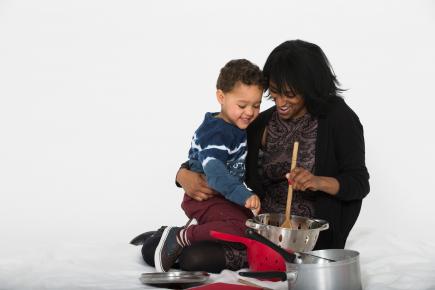birth to school study & tracer study
The Birth to School Study (BTSS) is a longitudinal evaluation of the Peep Learning Together programme, with a sample size of 600 families. The Learning Together programme aims to encourage children’s early language, literacy and numeracy and to nurture their self-esteem by supporting parents. Consequently, the BTSS investigated the effects of the programme on parents as well as on children. The six-year span of the study allowed time for potential effects on the parents to ‘filter down’ to the children. The study was carried out by the University of Oxford (2005).
Families who had participated in the Learning Together programme in Oxford were compared to children who lived in a similar area in another city but had not received the programme. Propensity Score Matching was also used to refine the comparison. The children were assessed each year using standardised instruments including measures of language, literacy, numeracy and general cognitive ability. Their socio-emotional development, including self-esteem was also assessed.
Overall, the study found that children who participated in Peep made better progress in a set of skills related to early literacy development, and that they had higher self-esteem. As well as contributing to children’s own development and relationships, these characteristics help their school-readiness.
key findings
The effects of Peep on parents
Peep parents, compared to matched parents from the comparison area, reported a significantly enhanced view of their parent/child interaction when their children were aged one.
When the children were two years old, Peep parents were rated significantly higher on the quality of their care-giving environment.
The effects of Peep on the cognitive and socio-emotional development of children
Peep children made significantly greater progress over time than matched children from the comparison area in a range of skills related to language development and future literacy success:
- vocabulary
- phonological awareness of rhyme and alliteration
- letter identification
- understanding of books and print
- writing.
Children from the Peep group showed a significant advantage (aged 5), compared to the matched children from the comparison area, in the following measures related to self-esteem:
- peer acceptance
- cognitive competence
- physical competence
- general competence
- total self-esteem.
To read more about the Birth to School Study, download a research summary or full report (189 pages), or contact us if you'd like us to send you a copy of the Oxford Review of Education article about the Study. You can also read our Tracer study, for which five of the Birth to School study parents were interviewed, as their Peep children were starting secondary school.
Follow the links for more information about our Learning Together Programme and Training.

‘The results strongly support existing evidence that good quality parenting leads to improved cognitive and social skills for the children.’ (Evangelou, Brooks, Smith and Jennings, 2005)
